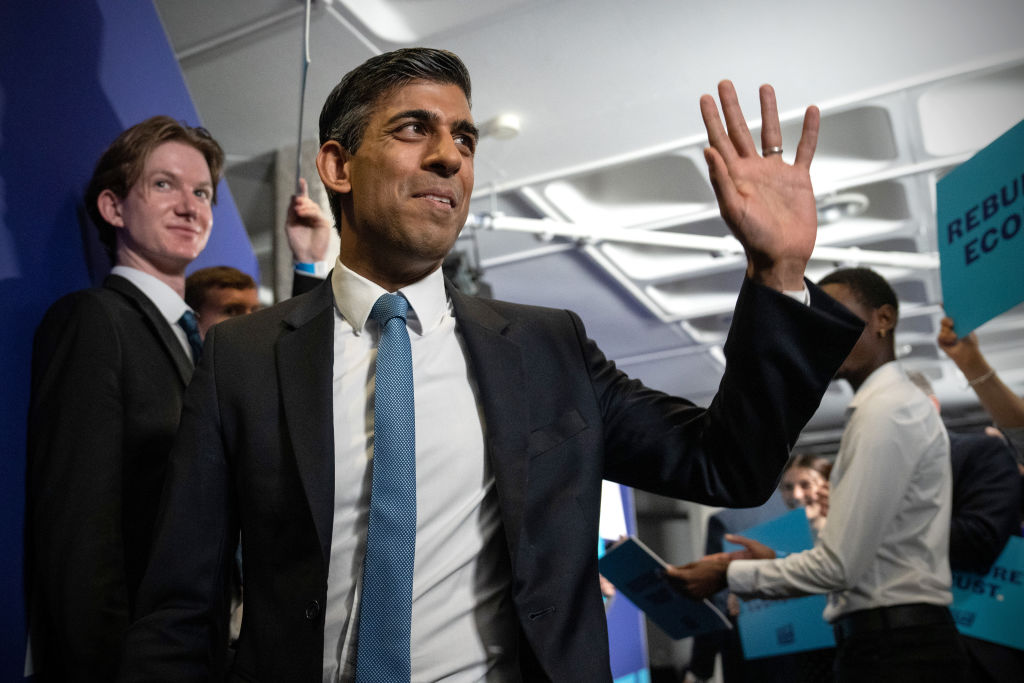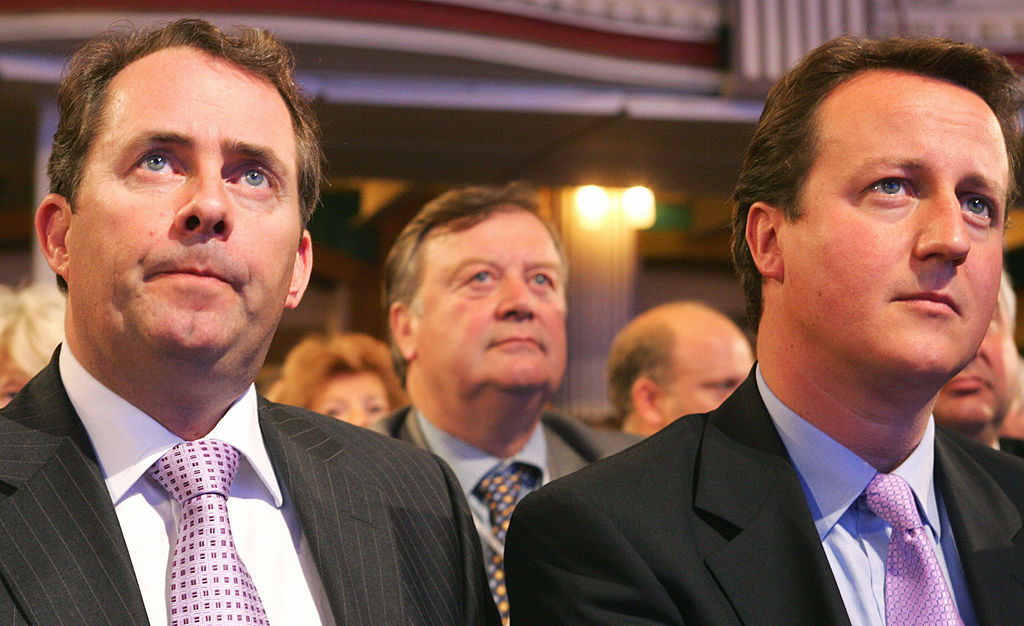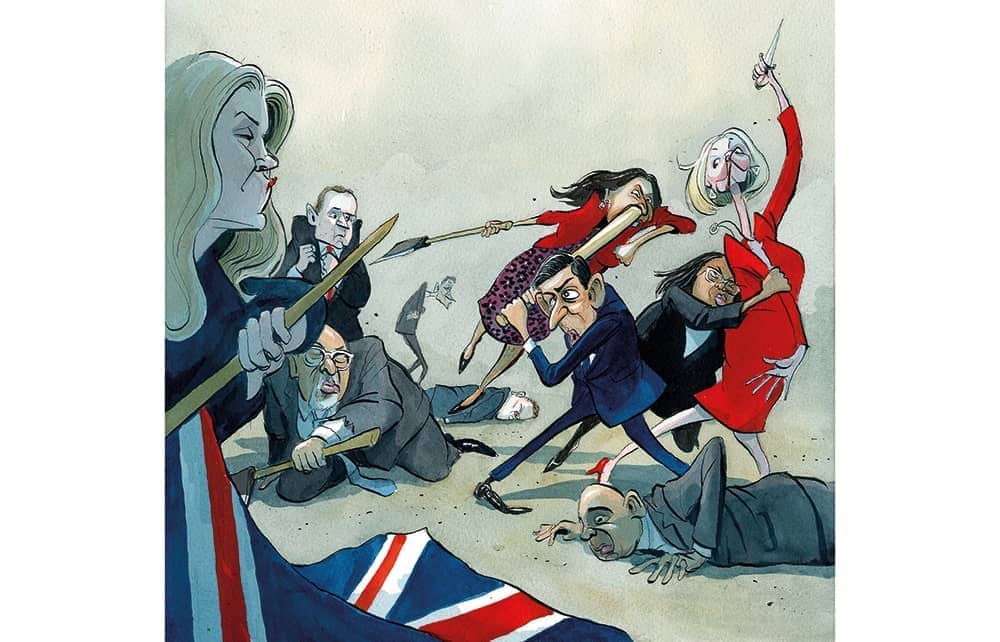To Ronald Reagan, it was the 11th commandment: thou shalt never speak ill of a fellow conservative. Tories tend to observe the opposite rule: anyone ambitious enough to stand for party leadership needs to be targeted and weakened – ideally, destroyed. Attack dossiers will be drawn up, rumours concocted and poison darts blown. Fighting for leadership does not mean articulating a positive message or agenda nearly as much as it means trying to crush the other guy. And whoever can survive such attacks might – at a push – deserve the job.
The Conservatives ought to be having a period of reflection. They had, in Boris Johnson, a proven election winner – but one who used his 80-strong majority to increase the size of the state and force his MPs to vote against their manifesto pledge and raise taxes. Lockdown made things worse, with No. 10 governing by edict at staggering expense. It was imposed with minimal parliamentary debate or scrutiny. This created a parliamentary pressure cooker in which MPs grew steadily angrier – ready to explode when the lid was lifted.
This is perhaps why the leadership election has ended up as a group therapy session rather than a competition of ideas. Of the 11 candidates, nine promised immediate tax cuts – but almost no one explained how they would be financed. By spending cuts? If so, where? By more debt? If so, is that wise when interest rates are surging? The tax rises happened in the first place because the Tories spent first and thought later. If they are to escape the high-tax, low-growth trap, they will need a plausible plan to do so. But at present it seems they’re more interested in blame – and turning the leadership race into the Hunger Games.
The negative briefings started before Boris Johnson resigned. Anyone likely to run was targeted and briefed against. Whispers went round: have you heard about those photos from the nightclub? Or that he had staff deliver government papers while he was in the bath? ‘He won’t stand,’ one candidate assured me about a potential rival, ‘because he knows what he’s done and he knows his family could not withstand the scrutiny.’ Others speculate about who has taken Russian money. This is the warning phase, when rumours are put about with a hidden message: don’t you dare go for the top job.
‘Poisonous gossip, attack memos, allegations thrown around,’ said Sajid Javid before he dropped out of the running. ‘This isn’t House of Cards or Game of Thrones.’ He’s right – it’s far worse. This is an odd campaign fought in a House of Commons where hearsay travels very fast, so ‘black ops’ can be very effective. The Prime Minister’s downfall did, after all, come after drunken groping by Chris Pincher, the deputy chief whip, who did have a bit of a reputation. So similar allegations about anyone else carry weight. The accusations are coming: personal and political, true and false.

If anyone can get past Tory attack dogs, then they’ll have nothing to fear from Labour
The first dossier was ‘get ready for Rishi’ – a document circulated on WhatsApp groups in the form of a fiery J’accuse aimed at the former chancellor. Sunak ‘enabled Boris Johnson’s reckless overspending and increased UK taxes to the highest level since Clement Attlee,’ it says. He ‘secretly held a “Green Card” to work in the US 18 months into his chancellorship of the UK’, then ‘publicly lied not once but twice when seeking to explain his wife’s “non-dom” tax status’. There were many other similar accusations.
Such hit jobs often leave a DNA trace of the would-be assassin. The properties section of this document had one Patrick Robinson as the author, who turned out to be working for Priti Patel. He claims he merely passed the document on. But the general tone – despair and borderline contempt for high-tax, high-spend government policies – was of a piece with what the Home Secretary is known to believe. ‘We hope that candidates will all run a clean campaign,’ said a source close to Patel.
Does she really? To a great many Tories, dirt is the whole point. If anyone can get past Tory attack dogs, the bitchiest and fiercest in the world, then they’d have nothing to fear from Labour. The word is that at least two of this year’s candidates have hired private investigators to dig up muck on themselves as well as on their rivals – knowing that they might as well find out whatever their fellow Tories will have on them.
In this climate, secrets don’t stay secret for long. When the law was changed to grant maternity leave to cabinet members, some accused Penny Mordaunt of insisting that the legislation referred to a ‘pregnant person’ rather than ‘mother’. When Mordaunt denied this, Suella Braverman, the attorney general, took the unusual step of going public. The ‘inaccurate recall of uncontested facts has badly hurt our party,’ she said, so all candidates should ‘accurately recall what we did and said in office’. Mordaunt did not respond. Even now, she tries to avoid straight answers about gender identity.
Nadhim Zahawi took the unusual step of announcing that he was ‘clearly being smeared’ by a black-ops campaign. He denied allegations that he is under investigation by the tax authorities – but his denial adds publicity to the allegation, of course. He is facing questions that make him look dodgy rather than guilty of any serious wrong-doing. He boasts of having run YouGov: what was his role there? How was he paid? And that oil company he had with his wife: when did he sell his shares, and why? If he allows himself to be diverted into answering such questions, he can be made to look shifty enough to put people off.
‘It’s very sad that such smears should be circulated,’ said Zahawi, ‘and sadder still that they have been published.’ Sad, perhaps, but not at all surprising: it was ever thus. When the then unmarried Liam Fox ran for leader in 2005, allegations were put out about his sexuality. When he refused to respond, a newspaper front page screamed ‘Gay smears and me’ on the morning of the crucial vote. He missed out by 52 votes to 57.

To this day, Fox’s allies believe that he was barred from the final round because members of David Cameron’s team voted for David Davis – thereby (in his view) picking the weaker opponent. Michael Gove’s supporters believe that members of Team Boris rigged things so the Prime Minister could face a runoff against Jeremy Hunt in 2019. And now some of Liz Truss’s supporters are openly accusing Team Sunak of the same ‘dirty trick’: of engineering things so that Sunak ends up facing low-energy Hunt in next month’s duel. It is, of course, far from clear whether Sunak has enough votes to start asking his allies to vote for anyone else, but this is certainly an established tactic.
The problem is that Tories are so good at attacking each other that they have become addicted to this negative campaigning. They have forgotten how to build a positive case. It can work: the 2015 election was won after Ed Miliband was effectively portrayed as ‘Red Ed’, a socialist disaster ready to place price caps on energy companies etc. He was defeated, but his Red Ed ideas were adopted as Tory policy. The 2019 election was decided by an effectively manipulated fear of Jeremy Corbyn and his proposed ‘magic money tree’ – something that the Tories, back in office, never stopped shaking.
When Tories encounter positive campaigners – the Scottish National Party and its upbeat campaign for independence – they often don’t know how to respond. Boris Johnson’s innate optimism, which he projected so well, was not a Tory policy but part of his own brand. Without him the party risks slipping back to its old ways, for instance by stopping Mordaunt by circulating nicknames such as ‘part-time Penny’ or ‘Penny Dormant’. It makes it harder for anyone to suggest anything positive.
This explains why the candidates’ campaigns have so far been halfhearted and their videos laughably bad. These are Potemkin campaigns, which give the illusion of someone canvassing opinion and disguise the fact that most of the real decisions are made by cajoling a small number of MPs. This means that good ideas are seldom incubated and bad ideas seldom challenged, because the race is not about ideas. It’s about backroom deals in the House of Commons tearooms – offers of jobs or other such horse-trading. Almost every-thing is about tribalism and very little of it about planning the future of the country.
Another worrying trend is the tendency to talk about the Johnson years as a disaster: a message that will not be lost on the Labour party or the general public. It also raises questions for the Tories. If they are so committed to lower taxes, and are against so much of what went on, why didn’t they speak up before? Johnson admitted at the start of last summer that he was planning a tax rise on the working poor to subsidise the care-home costs of wealthier property-owners. If all the candidates are united in thinking this an appalling idea, why did none of them say so at the time? Only Liz Truss can claim to have opposed the tax rise in cabinet.
If Sunak was forced into tax rises by a high-spending prime minister – if he genuinely opposed HS2 and the care-home plan – then why would he not change any of that now? If finally freed of the spendthrift neighbour in No. 10, why does he not proclaim a radical shift? He accuses his rivals of making ‘fairytale’ promises of tax cuts, but he seems determined to fight his campaign without offering much detail on what he would do differently.
It could well be that Sunak sees no realistic alternative to a high-spend, high-tax future: which is why, after saying he likes lower taxes, he doesn’t prioritise them. His only firm plan is to hike corporation tax to 25 per cent from 19 per cent, having already lifted the tax burden to a 74-year high. Jeremy Hunt says he’d cut this tax to 15 per cent while increasing defence spending. The plan is to keep shaking the magic money tree.
It’s quite possible that the leadership race will move to its final stage without the key policies (as opposed to the personalities) being scrutinised with anything like the necessary vigour. All along, this was the problem with deposing Boris Johnson. The Tories would talk about him, but only him – and now they have jettisoned him without any real plan of who or what follows. Now the time has arrived to come up with a plan, it turns out they do not have any better ideas – other than to say how hopeless (or crooked or deviant) most of the candidates are. The Labour party can sit back and watch as the enemy self-immolates.
To tear down is far easier than to rebuild. Throughout the debate about Boris Johnson’s future, a credible, radical, alternative idea was never articulated. Perhaps one will emerge from the leadership election, but the Tories are running out of time.







Comments